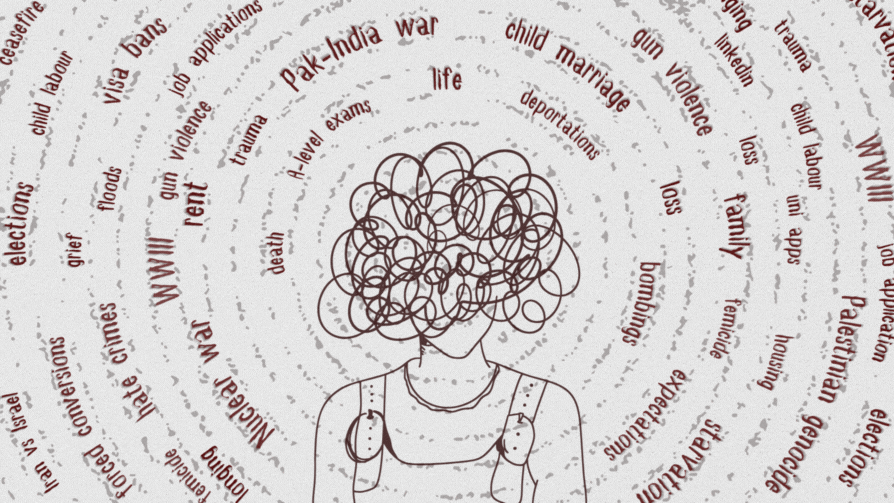Empower, not endanger: Why Karachi brand Manto had to tell its customers to set aside its clothes
I don’t remember the last time I felt this scared of wearing anything, let alone something that bears Urdu text. But just one scroll through X (formerly Twitter) will tell you that the Ichra case has instilled a certain level of hesitance, if not fear, in many, myself included, of wearing our favourite shirts from Karachi-based brand Manto — a decision that did not warrant a second thought a mere two days ago.
Manto inspires a certain level of defiance in the realm of Pakistani fashion with its statement accessories and prints featuring empowering Urdu words or handpicked couplets from revered poets such as Allama Iqbal, Faiz Ahmed Faiz, Mirza Ghalib, and Jaun Elia. Known for its distinctive style and commitment to empowering Urdu literature — the look of which could be confused for Arabic, especially when calligraphed — the brand felt compelled to put out a statement on Monday after a false ‘blasphemy’ alarm left a woman helpless, hiding in a shop at a bazaar in Lahore, out of fear of being lynched.

The brand, reaffirming its commitment to safety and respect for all, expressed deep concern for its customers who might fear facing a similar fate as the woman whose clothes featured benign Arabic words meaning ‘beautiful’ and ‘life’ that were confused for verses from the Holy Quran.
Manto’s statement, shared on their Instagram, reads, “In light of the current events, we feel extremely sad seeing all that has happened. This is why we wanted to address this heart-wrenching issue. Please know that your safety as an individual must always be a priority. And at any given moment, if you feel uncomfortable or unsafe wearing your Manto outfit, then please just set [it] aside.”
The brand reiterated that it would never, under any circumstance, want its customers to put their safety at risk because of the chance that the text on their kurtis or scarves might be mistaken for something it was not. “Every religion teaches us one essential truth: violence against women is unacceptable. It goes against everything we believe in — our values, our teachings, our faith. Every woman deserves to feel safe and respected.”
The brand assured that their actions aligned with their values, therefore they “consciously avoid using words that might have double meanings,” including poetry that may directly or indirectly reference or address God. “Again, we want to stress to you that we are extremely grateful for your love and support but please be safe and put yourself first.”
But with polarising views surrounding Manto’s statement on the incident, it felt imperative to have a conversation with the founder of Manto about what prompted the brand to make this statement and the kind of measures it would be taking moving forward, since it’s ethos revolves around inscription of Urdu calligraphy on prints that might carry the risk of being misunderstood.
Helming a brand that believes in creating dialogue through fashion, Manto founder Salman Parekh shared with Images that what needs to be done at any particular time — especially during such polarising times — is to create dialogue that would instil awareness instead of fear. “Whether it’s a disagreement we’re tackling or extremism, we believe in the power of dialogue, being able to ask the right questions and tackling those questions the right way will educate people,” he said.

Parekh noted that while what happened at Ichra Bazaar was extremely disheartening, it has given us all something to think about. And a recent interview of ASP Sheharbano Naqvi has highlighted a conversation that needs to be had about mob mentality. “Unfortunately, the essence of what ASP Sheharbano was saying was that when in mobs, people get so involved they forget their boundaries of tolerance and end up doing something that they wouldn’t otherwise as individuals. So the only thing all of us can do is create dialogue with the right intention to make sure that the people who do not understand either mob mentality or our work, or what we wear and why we wear it, eventually start understanding.”
When asked about any security measures he would now consider taking for his outlets, Parekh said, “To be honest, we are not any more scared, we are worried, definitely, but not scared. Because neither did the victim of the Ichra case do anything wrong and neither are we doing anything wrong. But there is concern. I just hope we can utilise this as an opportunity to create dialogue instead of furthering a divide. It’s completely fine if someone thinks our dresses are not the kind that should be worn because we encourage everyone to come to the table and talk about it.”
Parekh said the brand has not been subjected to scrutiny in the past — even when Manto was newly introduced and dresses with Urdu inscriptions were a novelty. “People with religious values have always embraced our work. The element of criticism has not been much. Because I do understand that there is this level of responsibility we have as a brand to double-check whether anything we print is triggering to any individual or group. We also make sure that we present our customers with all the translations of the words we are using on the clothes they want to buy.
“This is something that we have been very cautious of from day one, we had been very careful from the get-go that none of our designs hurt anyone’s sentiments. We were always wary of using words that may refer to — directly or indirectly — any religion, and the scope of words we used had to be empowering.”

While Manto’s statement underscores the brand’s proactive approach to ensuring that its designs are sensitive to cultural and religious sensitivities, the Ichra incident serves as a stark reminder of the importance of tolerance and understanding in a diverse society. And like Parekh said, we need to work on fostering a culture of respect and empathy through dialogue, where individuals can express themselves freely without fear of being persecuted.











Comments